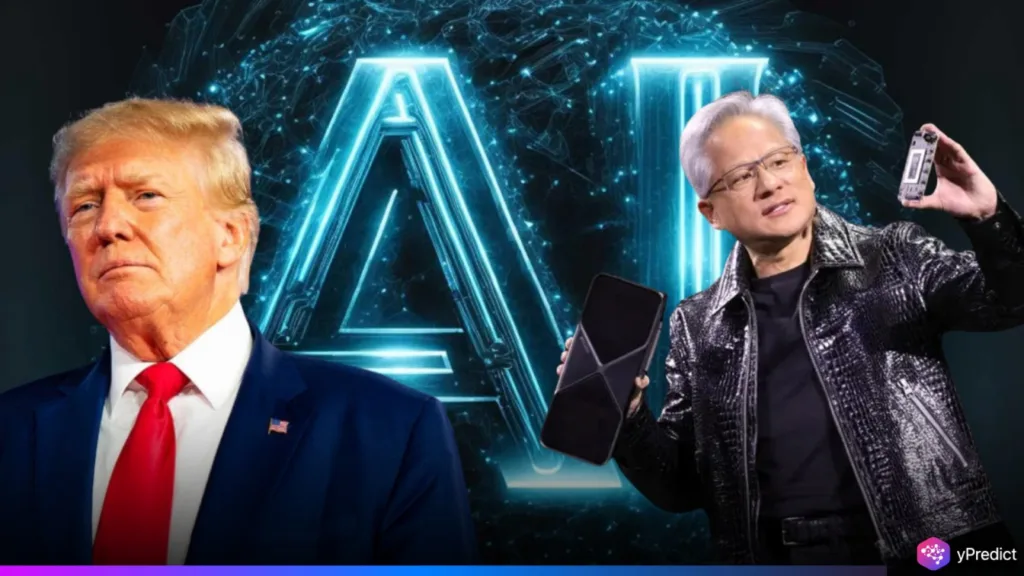
Nvidia CEO Jensen Huang has publicly supported US President Donald Trump’s request to loosen AI chip export limits to China, calling present controls under the former Biden administration “a failure.” At the Computex 2025 conference in Taipei, Huang voiced support for the Trump AI export policy, criticizing Biden-era restrictions as counterproductive. He said the restrictions were designed to limit China’s access to sophisticated AI technology, but have instead harmed American businesses and expedited China’s push for self-reliance.
With billions in lost revenue and shrinking market share in China, Huang urged a policy shift toward global cooperation. His remarks reignite the debate over how best to balance national security with global technological leadership in AI.
Export Controls Deemed Counterproductive
Reuters reported that Huang has sharply criticised the Biden administration’s export restrictions on sophisticated AI chips to China, calling the policy useless and economically destructive. Huang stated at the Computex technology conference in Taipei that these regulations, which were designed to limit China’s access to cutting-edge semiconductors, have instead fuelled rapid domestic innovation while costing US companies billions of dollars in lost revenue. Huang told the media that,
The local companies are very, very talented and very determined, and the export control gave them the spirit, the energy, and the government support to accelerate their development. I think, all in all, the export control was a failure. China has a vibrant technology ecosystem, and it’s very important to realise that China has 50% of the world’s AI researchers, and China is incredibly good at software.
The Biden administration’s export curbs aimed to block China from using advanced Nvidia chips to boost its military and AI capabilities. The U.S. export rules barred companies like Nvidia from selling high-end AI chips such as the H100 and A100 to Chinese firms. However, Huang noted the policy backfired, spurring Chinese firms to fast-track tech self-reliance through companies like Huawei and domestic supply chains.
Huang revealed that Nvidia’s market share in China has dropped from 95% to 50% due to U.S. export restrictions. He warned that with China’s AI sector projected to hit $50 billion next year, U.S. firms risk losing a major growth opportunity. Nvidia has already incurred a $5.5 billion charge from redesigning its H20 chips to meet compliance rules, with potential losses reaching $15 billion.
Global Licensing at the Core of Trump AI Export Policy
Jensen Huang applauded the Trump administration’s recent decision to reverse elements of the Biden-era AI chip export policy, describing it as a step towards a more practical and global-minded approach. He indicated support for replacing the tight, tier-based limits with a worldwide licensing regime based on bilateral agreements, which he believes will offer the United States more leverage in trade discussions while maintaining national security.
Speaking at Computex in Taipei, Huang stated, “President Trump realises it’s exactly the wrong goal,” emphasizing that overly restrictive policies only accelerate foreign competition. He argued that a licensing model reflects the global nature of AI development and would allow U.S. firms to remain competitive in high-growth markets like China, which alone could be worth $50 billion annually.
Conclusion
Jensen Huang’s strong advocacy for reforming U.S. AI export controls highlights the widening gap between Washington’s geopolitical priorities and the tech industry’s global business dynamics. As Nvidia incurs steep losses and China rapidly advances its AI capabilities, the current restrictions are facing renewed criticism. Trump’s proposed shift to a global licensing model suggests a move toward strategic engagement rather than isolation. With national security, innovation, and economic leadership all at stake, the policy choices ahead will not only shape the trajectory of AI but also determine America’s standing in the global tech arena.






